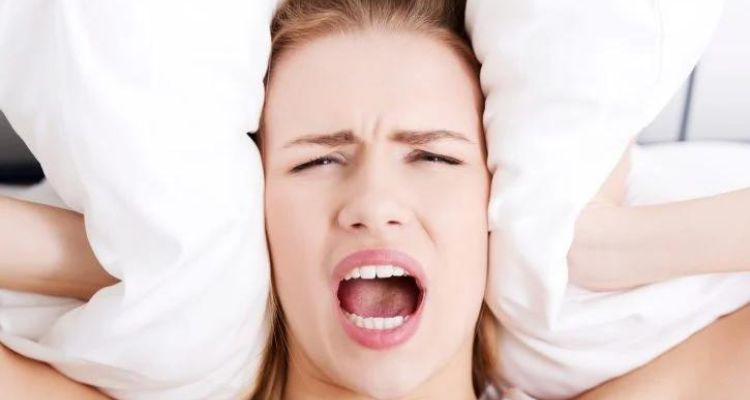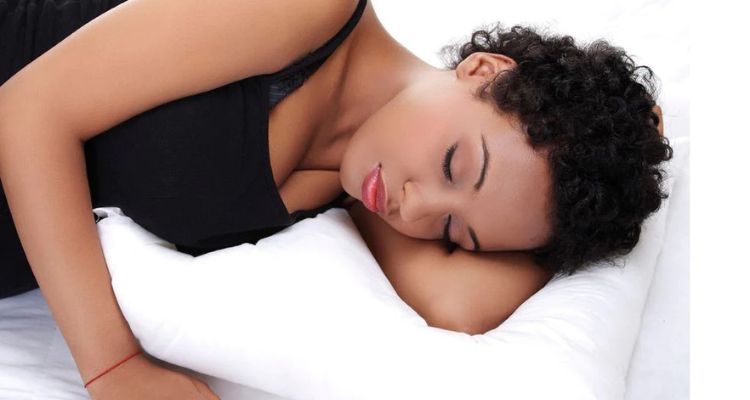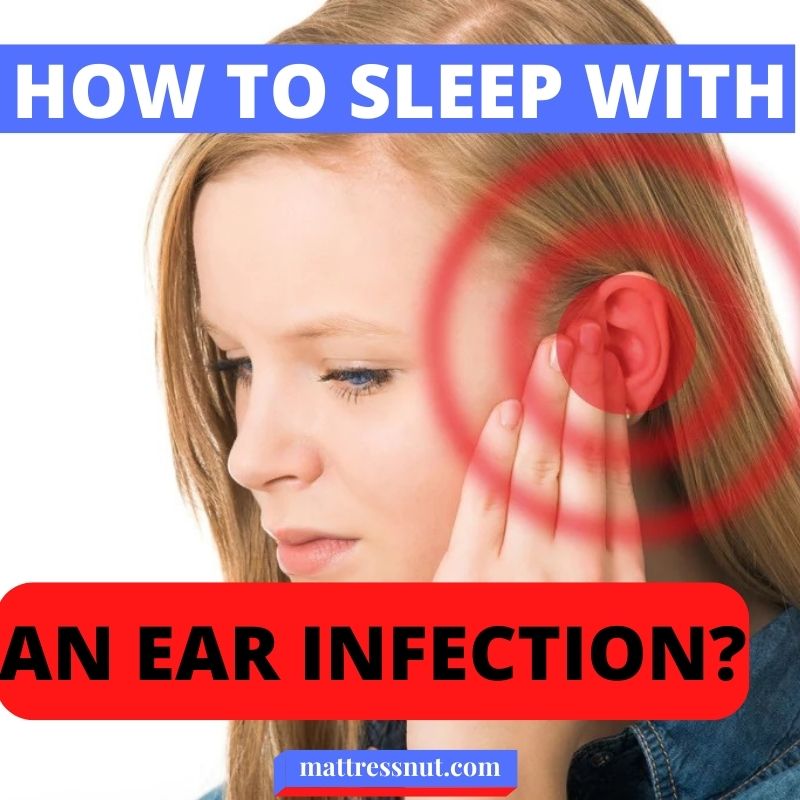Sleep helps us relax after a busy day and is essential for our health. We have to sleep so our daily energy level doesn’t drop. But if you have an ear infection, it can disrupt your sleep patterns significantly.
This guide will present ways to deal with ear infections. So keep reading until the end and find ways to manage your infection for a restful night’s sleep.
Ways to Manage Your Ear Infection to Prevent Sleep Disruption
Sleeping Upright or Elevation
Elevation or sleeping upright can be helpful when fighting an ear infection. Sitting up while sleeping lets the fluid inside your ear drain pretty conveniently. It can ease pressure and alleviate pain in the midsection of your ear.

You can try and prop yourself up on a pillow stack. Another good option is to sleep in an armchair or a reclining sofa. As long as you are upright, draining your ear will be much easier, and you will notice an improvement in your symptoms, resulting in better sleep.
Over-the-counter painkillers
Pain relief medicine like ibuprofen or paracetamol for adults right before bedtime can be handy in dealing with an ear infection.
But you need to keep in mind that children under the age of 2 should not consume these medicines for ear infections unless advised by an experienced pediatrician.
Sip and swallow
Drinking water before bed can help you deal with an ear infection. You can do some swallowing and neck exercises before bed.
It comes in handy because the swallowing motion can assist in triggering the muscles of your eustachian tubes that go from the midsection of your ear to the back of your nose. You are essentially opening and draining the fluid by boosting the natural means that reduce pain.
Switching positions
When you lay on your back, it puts more pressure on your ear. And this is something you must avoid when dealing with an ear infection. With that pressure, pain occurs in your ear’s midsection, preventing you from sleeping comfortably (also check 10 amazing mattresses for back pain).
But you can tackle that by regularly changing your sleep position as it would relieve some pressure (also check the best selling mattress toppers for pressure points). Sleeping straight is always a good option.
But if you are dealing with those natural sensations you are familiar with; it is best to sleep on your side. If the infection is only in a single ear, you must sleep on the opposite side. By doing so, you are avoiding adding more pressure to your affected area.
Allergy and congestion relief
Being an adult, if you can link your ear infection with your respiratory infection, such as a cold, you might temporarily benefit from nasal or oral decongestants.
They can help you clear any blockage and relieve pressure from your ear, throat, and nose. Managing congestion and allergy symptoms caused by ear infections can improve comfort and sleep.
If you think your ear infections are due to some allergy, consider using an antihistamine such as chlorpheniramine to improve symptoms. But make sure you consult with your doctor first. There is a chance that your doctor can prescribe you something more effective.
You should not give kids dealing with sleep disruptions due to ear infections any decongestants or antihistamines for managing these symptoms. You should seek their pediatrician’s advice on sleep disruptions while containing ear infections.
Applying heat
Heat is one of the most effective pain relievers, naturally. You can add warmth to your infected ear, which might be enough to go back to sleep. Apart from pain relief, heat can assist in congestion within your eustachian tubes or inner ear.
Now there are different ways you can apply heat. Use a warm compress and press against the warm towel to your ear region for instant relief. Moreover, you can point at a hair dryer, set it at the lowest, and keep it at least 6 inches away from your ear.
Hold it for about five minutes, and you immediately start feeling the difference. You can even get the same effect using a bottle with warm water or an oven-safe plate.
Trying a vasoconstrictor
Sprays that come with vasoconstrictors primarily focus on nasal blockages. But they can have an indirect effect on your auricular congestion.
For instance, these vasoconstrictors contain phenylephrine, and they can assist in shrinking the section around your mouth where eustachian tubes are present.
With the shrinkage, these tubes get more room to expand, and as a result, they improve the overall drainage of your inner ear.
Home Remedies for an Ear Infection

That nagging pain inside your ear can be pretty disturbing and uncomfortable. So, here are some home remedies you can try to relieve pain when it gets out of control.
Hot or cold compress
You can use a heat or ice pack and place it on your aching ear to deal with the pain. The temperature that you go for this pack is entirely up to you. But you need to ensure that the pack is completely wrapped in a towel, so you don’t feel it is too hot or too cold. You can alternate between warm and cold compress every ten minutes.
Neck exercises
Stretching and rotating your neck can help ease that pressure in your ear and help clear out your ear canal. You can repeat these exercises throughout the day and before going to bed.
Hydrogen peroxide
Another remedy is to put a few drops of hydrogen peroxide into your infected ear. Let it be there for a few minutes, drain it in your sink, and rinse off your ear. It can help in reducing pain and relaxing pressure.
Ginger
Ginger has various anti-inflammatory properties; you can apply it around your outer ear canal; it will help relax your pain.
When to See Your Doctor?
You need to see your doctor if the symptoms of your ear infections remain for 2 to 3 days, even after consuming your over-the-counter medication and home remedies. Visit your doctor if you have other conditions, such as TMJ or temporomandibular joint dysfunction. If you have to deal with ear pain and trouble while yawning, talking, and chewing, you should consider visiting a dentist or a TMJ expert.
What Remedies Should You Avoid?
There are a couple of remedies you should stay away from when you are dealing with an ear infection, disrupting your sleep.
Using numbing ear drops
These numbing ear drops are a popular remedy that might help ease your ear infection. But you need to think twice before you use these drops.
These drops have benzocaine, and many similar drops also have a series of other herbal essences that can provoke some unfavorable response in your ears. Some potential side effects include a stinging sensation in your ears or other allergic reactions. A better practice is to get in touch with your physician before you use these drops
Herbal essences and essential oils
The most popular home remedies associated with ear infections include some essential oils and herbal essences. And some of the most commonly used for this purpose have a formula based on mullein, garlic, tea tree, and lavender.
These oils can be anti-inflammatory and antibacterial; it is best to use them with caution. Moreover, when you use these oils inside your ear, they will only reach where the impermeable eardrum is present.
How To Sleep With An Ear Infection
Importance of Sleep
Sleep is vital for daily energy and overall health. An ear infection, however, can significantly disrupt sleep patterns, making it essential to find ways to manage the discomfort and get restful sleep.
Methods to Prevent Sleep Disruption Due to Ear Infections
Elevation or sleeping upright facilitates ear fluid drainage, reducing pressure and pain. This can be achieved by using pillows, sleeping in armchairs, or reclining sofas. Over-the-counter painkillers like ibuprofen or paracetamol can provide relief, but should not be given to children under 2 without pediatric advice. Drinking water and performing swallowing exercises can also help, as swallowing activates the eustachian tubes, facilitating natural fluid drainage.
Switching sleeping positions can alleviate ear pressure, and if the infection is in one ear, sleeping on the opposite side can help. For those linking ear infections to respiratory issues, decongestants might be beneficial, but always consult with a doctor. Lastly, applying heat to the ear can provide relief and assist with congestion.
Home Remedies for Ear Infections
There are several home remedies that can alleviate ear pain, such as using hot or cold compresses, neck exercises, hydrogen peroxide drops, and ginger applications around the ear. However, it’s essential to know when to seek medical advice. If symptoms persist for 2-3 days despite remedies and over-the-counter medications, it’s time to see a doctor.
Remedies to Avoid
Numbing ear drops containing benzocaine and certain herbal essences can provoke adverse reactions, including stinging or allergic reactions. Essential oils like mullein, garlic, tea tree, and lavender, while potentially beneficial, should be used with caution.
Conclusion:
Sleeping with an ear infection can be a huge problem if you cannot effectively contain your infection. You have to ensure that you don’t go for any home remedies that are unsuitable for you. Use pillows to ensure you keep your infected ear higher than your body. There are various other ways to deal with ear infections to ensure you can sleep comfortably at night.
Sleep with an ear infection FAQs
Do these ear infections tend to get worse during nighttime?
Yes, the pain usually gets worse at night. It will worsen when your child is chewing on their bottle or lying in bed. These are the times when your ear is facing the most pressure.
How should I sleep to relieve ear pain?
The best way is to rest your head on a couple of pillows and keep your affected ear higher than the rest of your body. You need to sleep on your healthy ear because less pressure equals less pain. The difference in pain might not be that much, but it certainly reduces.
What should you avoid with an ear infection?
Lying down straight or on the side of your infected ear is a big no-no. You should avoid any hard-to-chew food items. Make sure you stay away from the cold as much as possible.

